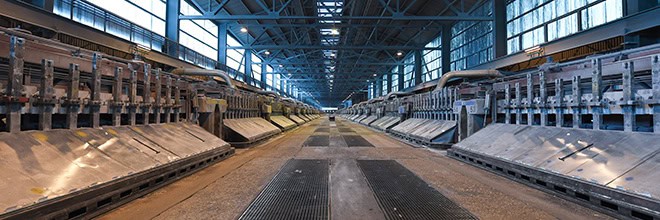
German aluminum producer Trimet Aluminium expects strong aluminum demand in 2019 but the global impact of U.S. import duties makes forecasts difficult, said executive board member Thomas Reuther.
Trimet has not imported aluminum scrap from the United States, he said, despite some market expectations of more U.S. sales to Europe to replace lost exports to China. High alumina prices are a concern.
“I expect global demand for aluminum to increase in 2019,” Reuther said in an interview during the LME week. “But the customs duties first imposed by the U.S. are having an impact on trade flows, so demand in regional markets is more difficult to forecast.”
The United States imposed import tariffs of 10 percent on EU and Chinese aluminum in March. U.S. sanctions have also been imposed on Russian aluminum producer Rusal which meant an important aluminum oxide supplier for Trimets aluminum smelters was no longer available.
Trimet said it has mostly been able to safeguard supplies of aluminum oxide for its production sites.
“It is very important for the production of aluminum in Europe and worldwide that a positive and dependable agreement is reached about the U.S. sanctions on Rusal,” Reuther said.
“The current situation with temporary solutions brings uncertainty into an already volatile market.”
Whether full production in the coming year can be achieved could depend on whether “the relationship between raw materials prices and aluminum prices again normalizes,” he added.
TRADE WAR
The global aluminum industry has been troubled by rising alumina prices partly because of a production stop at Brazil’s Alunorte alumina refinery, the world’s largest.
“The aluminia price is unusually high at the moment because of several factors,” he said. “But this is not reflected in the aluminum price. As long as this continues, this could hinder the full use of production capacity. But we expect the situation to normalize in a few months.”
Chinas imports of U.S. aluminum scrap are falling following the trade war between the two countries, generating speculation that more U.S. scrap would be sold in Europe. China’s imports of aluminum scrap are also being reduced because of the impact of its new environmental protection control standards which took effect in March.
Supplies in scrap are relatively high, with or without additional U.S. scrap being available, he said. “Scrap imports from the United States have not increased,” Reuther said. “We have not purchased scrap from the United States in the past and are currently not doing so.”
“We do not rule this out, but there are currently no grounds to do this.”
Trimet’s German plants produced some 625,000 tonnes of primary and recycled aluminum in its 2017/18 financial year ending on June 30, the same as the previous year and around full capacity. Trimet France produced an unchanged 140,000 tonnes of primary aluminum, he said.
“Automobile construction provides the main engine for demand growth,” he said. “Electro-mobility is providing additional momentum.”
“Demand in the energy sector is also growing. We expect stable demand from construction and packaging.”
